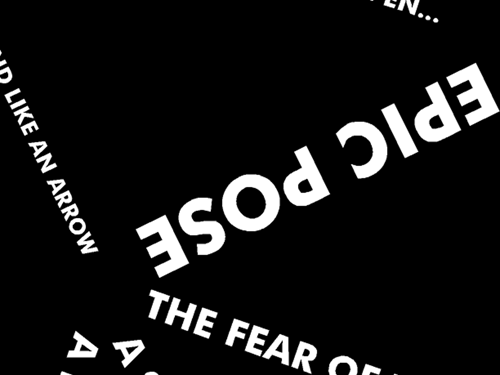An artist interview with Paolo Pedercini / Molleindustria
Luke Noonan
From Issue 1

How would you describe Ergon/Logos?
I described it as an unidentified playable object and as "a fast paced interactive storytelling piece that tries to be a meta-platform game based on the stream of consciousness of an egodystonic homosexual hero, but it fails miserably and becomes a piece of non-linear kinetic visual poetry written by a teenager obsessed with post-structuralist French philosophy."
Can you describe your creative process for Ergon/Logos? How similar or different was this from your normal process?
The process was really graphic design-driven. I basically composed the two readable spaces as they were some sort of visual poems or futurist Words-in-liberty tables, then I set up a system of "rails" defining the movement, speed, zoom and forks of the "camera". It's a really simple framework that doesn't require a lot of high level planning, you just put a word after another.
The field of "art games" was still very young when you started. What made you decide to enter the field?
Nobody actually used the term "art game" is 2003. There were artists making games, hacking games and making game-like interactive art. To me it was just a continuation of what I was already doing with other media: mostly fanzine, comics and music.
The term "Art Game" seems to be somewhat objectionable to many, would you agree? Are there any other common terms that should be retired?
There are many objections to the term, by calling some games "art" you sort of institute an old distinction between high and low culture. But I acknowledge the notion can be strategically used to make a point about the shallowness of most of commercial games.
Can games be Art? Can games be a kind of literature?
There's no ontological answer to the art/game debate. Contemporary artistic practice doesn't discriminate specific media or specific form. What is art and what is not is defined and redefined by the art system at large.
Can games be literature? They can be described and studied as texts - in semiotical terms - but I guess if you care about the usefulness of the word "literature" you should avoid to extend it to everything.
Is there a better way to talk about games, more useful than "art" or "literature" for example?
Video games are just the digital incarnation of a cultural expression that precedes even literature. Games are one of the most ancient cultural forms and there's no reason why we shouldn't put videogames in relation with sports, child's play in humans and animals etc.
The music helped to build the intensity of the piece in a wonderful way. How do you feel about the inherent trans-media nature of video games?
It was a fortunate match. I think there's the still unexplored possibility to have music-games that function as music videos, with a soundtrack that is not supporting the game but vice-versa.
How would you situate Ergon/Logos in relation to the classic text adventures like Zork and the other Infocom titles of the 70's and 80's?
The first section (ergon) was conceived as a sort of parody of the fantasy-themed text adventures you mention. The target of the critique was meant to be their excessive focus on actions, movements, fights, object manipulation and on the centrality of a single hero/character. These characteristics are still dominant in contemporary games. We often assume that games are only about controlling some kind of avatar in a more or less realistic 3D space and interacting with objects. It's a very limited and conservative view, in my opinion.
The second section of the game (logos) tries to envision a game based on pure concepts and association of words. In a way it reads as very poor poetry but the content is not that relevant. It's just a proof-of-concept.
What do you think the expressive/communicative/rhetorical potentials of games are?
Games and non-linear texts in general can easily describe very complex systems as the economic and social ones. Ted Friedman once said that it's easier to imagine a videogame based on Marx's Capital rather than to a movie.
You feel that gaming has arrived yet as a creative medium or is it still developing?
Recently there has been a lot of "linguistic" experimentation in the video game field, it's a really exciting moment. Games are obviously in constant development like any other media.
Many of Molleindustria's titles are sharply political do you feel that games are a better media for communicating these issues than, for example, text or traditional video? Why or why not?
As I said before, I think with non-linear texts we can represent complex systems in a clear and comprehensible way. It's easier to understand a intricate web of cause-and-effect relations by manipulating a playable model rather than reading his description as linear text. Playing a video game is mostly the same as understanding its mechanics. Simulations push the user to consider the "modelized" object as a whole organism in which every part is interrelated with the others. The hope is to use them as "cognitive maps", as tools that help us to understand the social or economic system we inhabit.
Is there a language of games, for example similar to the "language of film"? What does it mean to be literate in games?
There are a number of tropes, cliches, genres and conventions. You could draw a parallel between the Hollywood paradigm (continuity, etc...) and the recurring design choices you see in any game. There are several independent games that are playfully subverting these conventions in the way the surrealist filmmakers attacked the - at the time just established - language of film. Check Cactus' Psychosomnium for an example.
Author Biography
International media artist and noisemaker, gamer, poeticist, punk. Currently teaching and working on a MFA in the Department of Media Study at SUNY Buffalo.